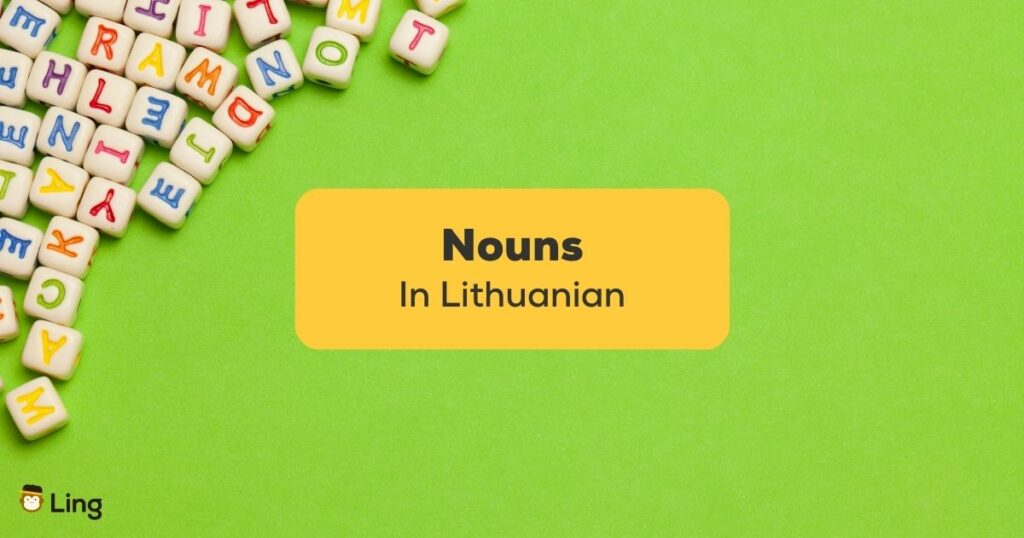So you’re fascinated with the Lithuanian language and want to learn more useful grammar? In this article, we will explore a diverse selection of more than 45 Lithuanian nouns, ranging from everyday objects to abstract concepts, and provide examples of how to incorporate them into sentences.
Whether you’re a language enthusiast, a traveler planning a trip to Lithuania, or simply curious about expanding your linguistic skills, this guide will serve as a valuable resource to deepen your understanding of this beautiful Baltic language. Let’s dive into the world of learning the Lithuanian language with these Lithuanian nouns and discover how they can be used to express ideas, experiences, and emotions!
The Break Down Of Lithuanian Nouns
Lithuanian nouns, much like in English, are words that represent people, places, things, and abstract ideas. Lithuanian nouns have gender (masculine nouns, feminine nouns, and neutral nouns), which determines the forms of adjectives and personal pronouns in the same context.
However, unlike English, Lithuanian nouns also have seven cases: nominative, genitive, dative, locative, nominative, vocative, and instrumental. What does this mean? It means that nouns change their form depending on their role in a sentence. Let’s take a look at some common examples to help it click more easily.
For instance, the word “namas” (house) changes to “name” when it becomes the object of a sentence, as in “Aš perku namą” (I am buying a house).
Similarly, the word “knyga” (book) becomes “knygą” when it is the direct object, like in “Aš skaitau knygą” (I am reading a book). These examples demonstrate the flexibility of Lithuanian nouns and how their endings adapt to the context of a sentence.
I know it seems complicated, but by understanding the gender and case system of Lithuanian nouns, beginners can start building sentences and expressing themselves more confidently in the language!
Learn about Lithuanian adjectives and Lithuanian pronouns next!

How To Use Lithuanian Nouns In A Sentence
In case the above paragraph seemed like a jumble of unique words to you, let’s break it down even further to get a better grasp of Lithuanian nouns and how they work in a sentence.
The most important thing to remember is that Lithuanian nouns in a sentence require an understanding of 3 things: their 1) gender, 2) case, and 3) agreement with other parts of speech and word order. Let’s explore how to incorporate Lithuanian nouns effectively in sentences with some examples:
Gender Agreement
Lithuanian nouns have masculine, feminine, and singular neutral genders, and they need to agree with associated adjectives and pronouns. For example:
- Masculine: “Didelis šuo bėga lauke.” (A big dog is running outside.)
- Feminine: “Graži mergina dainuoja.” (A beautiful girl is singing.)
- Neutral: “Švaru vaikšto gyvūnėlis.” (A clean animal is walking.)
Case Usage
Lithuanian nouns have seven cases, each serving a specific grammatical function. What the heck does ‘dative’ or ‘vocative’ mean? Look below for a better understanding of these cases. Let’s take the noun “stalas” (table) as an example and explore its usage in different cases:
- Nominative: “Stalas yra dideles.” (The table is big.)
- Genitive: “Po stalo yra knyga.” (There is a book under the table.)
- Dative: “Aš duodu draugui stalo.” (I am giving a friend the table.)
- Accusative: “Aš pamiršau raktą ant stalo.” (I forgot the key on the table.)
- Instrumental: “Rašau žinutę su rašalu ir popieriumi ant stalo.” (I am writing a message with a pen and paper on the table.)
- Locative: “Knyga yra ant stalo.” (The book is on the table.)
- Vocative: “Ačiū, staliuk!” (Thank you, little table!)
Gender-based Examples
Want another example? Let’s take the Lithuanian noun “automobilis” (car) and explore how it changes based on gender and case:
- Masculine Gender:
- Nominative: “Automobilis yra raudonas.” (The car is red.)
- Genitive: “Matysiu tavo automobilio spalvą.” (I will see the color of your car.)
- Dative: “Duosiu automobiliui raktą.” (I will give the car the key.)
- Accusative: “Aš matėme tą automobilį.” (We saw that car.)
- Instrumental: “Aš vairuoju automobiliu.” (I am driving a car.)
- Locative: “Automobilis yra garaže.” (The car is in the garage.)
- Vocative: “Automobili, tu esi nuostabus!” (Car, you are amazing!)
- Feminine Gender:
- Nominative: “Automobilė yra greita.” (The car (feminine) is fast.)
- Genitive: “Pamatysiu tavo automobilės greitį.” (I will see the speed of your car (feminine).)
- Dative: “Duosiu automobilei (automobilėi) raktą.” (I will give the car (feminine) the key.)
- Accusative: “Aš matėme tą automobilė.” (We saw that car (feminine).)
- Instrumental: “Aš vairuoju automobile.” (I am driving a car (feminine).)
- Locative: “Automobilė yra garaže.” (The car (feminine) is in the garage.)
- Vocative: “Automobilė, tu esi nuostabi!” (Car (feminine), you are amazing!)
By understanding the gender, case, and agreement rules, you can confidently use Lithuanian nouns to construct meaningful sentences and communicate effectively in the language! Practice, practice, practice, and you’ll start to get the hang of it.
Rapid Fire Examples Of Common Lithuanian Nouns
Below are 45 common Lithuanian nouns you may encounter in everyday life. Get those flashcards out and start practicing!
| English | Lithuanian |
| House | Namas |
| Car | Automobilis |
| Dog | Šuo |
| Cat | Katė |
| Book | Knyga |
| School | Mokykla |
| Tree | Medis |
| Friend | Draugas |
| City | Miestas |
| Job | Darbas |
| Food | Maistas |
| Water | Vanduo |
| Sun | Saulė |
| Time | Laikas |
| Money | Pinigai |
Other Common Lithuanian Nouns
| English | Lithuanian |
| Chair | Kėdė |
| Table | Stalas |
| Computer | Kompiuteris |
| Phone | Telefonas |
| Bicycle | Dviratis |
| Shirt | Marškinėliai |
| Shoes | Batai |
| Coffee | Kava |
| Music | Muzika |
| Movie | Filmas |
| Beach | Paplūdimys |
| Park | Parkas |
| Family | Šeima |
| Language | Kalba |
| Travel | Kelionė |

Relatable Examples Of Lithuanian Nouns
| English | Lithuanian |
| Window | Langas |
| Street | Gatvė |
| Garden | Sodas |
| Chair | Kėdė |
| Bed | Lova |
| Cup | Puodelis |
| Knife | Peilis |
| Key | Raktas |
| Bridge | Tiltas |
| Mountain | Kalnas |
| River | Upė |
| Cloud | Debesis |
| Mirror | Veidrodis |
| Hat | Skrybėlė |
| Clock | Laikrodis |

How To Use Lithuanian Nouns In Conversation
Now that you’re practicing how to use Lithuanian nouns in a sentence, let’s look at a mock conversation that you may encounter in the native language.
Person A: Labas! Kaip sekasi? (Hello! How are you?)
Person B: Labas! Puikiai, ačiū. O tau? (Hello! Great, thank you. And you?)
Person A: Taip pat gerai. Vakar nusipirkau naują knygą. (I’m also doing well. Yesterday, I bought a new book.)
Person B: Tai nuostabu! Kokią knygą perskaitėi? (That’s wonderful! What book did you read?)
Person A: Tai romanas apie meilę ir nuotykius. Jis buvo labai įdomus. (It’s a novel about love and adventure. It was very interesting.)
Person B: Skamba įdomiai. Kokie tavo planai šiandien? (Sounds interesting. What are your plans for today?)
Person A: Planuoju pereiti per miestą ir aplankyti gražią parką. (I plan to walk around the city and visit a beautiful park.)
Person B: Galvoju apie tai, kur pasivažinėti dviračiu. (I’m thinking about where to go for a bike ride.)

Person A: Tai puiki idėja! Norėčiau prisijungti prie tavęs. (That’s a great idea! I would like to join you.)
Person B: Žinoma! Gyvūnėliai yra labai sveikintini. (Of course! Pets are very welcome.)
Person A: Beje, galime užsukti į kavinę ir gerti kavą po pasivažinėjimo. (By the way, we can stop by a café and have coffee after the ride.)
Person B: Gera mintis! Kokia kava tau labiausiai patinka? (Good idea! What kind of coffee do you like the most?)
Person A: Aš mėgstu kavą su pienu ir šiek tiek saldiklio. (I like coffee with milk and a bit of sweetener.)
Person B: Suprantama. Susitinkame šiek tiek vėliau prie parko ir iš ten pradedame mūsų nuotykius? (Understood. Let’s meet a bit later at the park and start our adventure from there?)
Person A: Taip, tai gerai skamba! Mielai praleisiu laiką su tavimi. (Yes, that sounds good! I’d be happy to spend time with you.)
Person B: Iki susitikimo! (See you then!)
Person A: Iki pasimatymo! (Goodbye!)
Learn Lithuanian With Ling
Phew, that was a lot of information for one article! But if you practice enough, knowing how to conjugate a noun in Lithuanian will be as easy as 1, 2, 3!
Want more resources to help you learn Lithuanian grammar, especially since Lithuanian is such a niche language? Download the language-learning Ling App today from the App Store and Play Store. It is a highly researched app meant for a fun and personalized language-learning experience. Aside from Lithuanian, there are over 60+ other languages to learn on Ling. Download it today!


































































